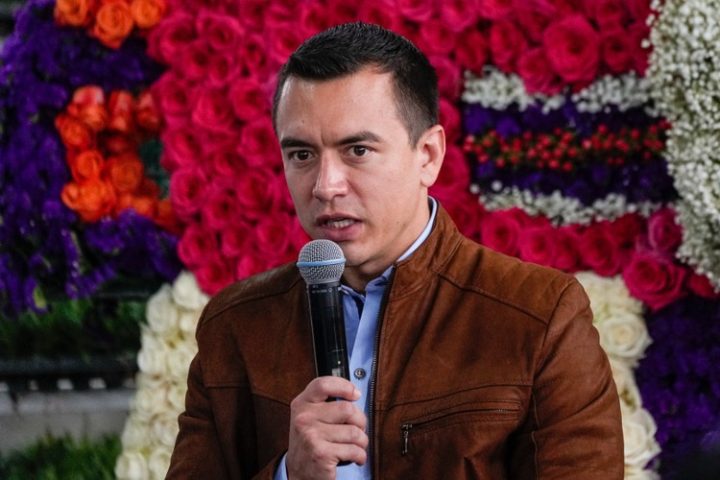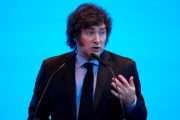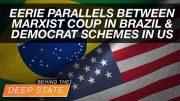
The recent Latin American trend toward right-wing governments, spurred by public demand for law and order, is in full force in the nation of Ecuador.
Daniel Noboa, the 36-year-old president of Ecuador, has thus far kept his promise to crack down on crime and corruption in the South American republic, going so far as to order a raid of Mexico’s embassy last Friday in order to arrest former Vice President Jorge Glas, a fugitive and convicted felon who had been taking refuge in the embassy — located in the Ecuadorian capital of Quito — since December.
Noboa is a businessman and son of Alvaro Noboa, the billionaire owner of a major banana exporter. The Noboa family boasts one of the largest fortunes in the country. Daniel Noboa assumed the presidency in November of 2023 after unexpectedly winning a special election in August.
The Ecuadorian president has rejected being labeled “left” or “right.” While he leans left on some social issues, such as support for LGBT, he ran on a combination of pro-business, free-market economics with tough-on-crime executive action — prompting many to categorize him as center-right.
Noboa’s presidency comes at a time when Ecuador has found itself grappling with the drug trade. Until approximately four years ago, Ecuador stood out as one of the most peaceful countries in Latin America. However, the landscape shifted when Mexican and Colombian cartels expanded their existing operations in Ecuador. They established a presence in coastal cities, taking advantage of top-notch ports to transport substantial quantities of cocaine, manufactured in neighboring Colombia and Peru, worth hundreds of millions of dollars.
Noboa assumed leadership of a nation where citizens seldom venture out unless it’s absolutely essential, with nearly everyone either directly or indirectly affected by crime, prompting many to contemplate migration. These decisions and experiences are corroborated by statistics: Last year marked Ecuador’s deadliest on record, with more than 7,600 homicides recorded — a significant increase from the 4,600 reported the previous year.
In response, Noboa has pledged to enhance police and armed forces’ resources and proposed the establishment of prisons akin to those constructed by President Nayib Bukele in El Salvador, featuring high-security, maximum-security, and supermax units. Additionally, he issued a decree designating more than 20 criminal groups as terrorist organizations and has scheduled an April referendum to seek voter approval for expanding the military’s authority to maintain a presence on the streets and manage prisons.
According to a poll cited by the Associated Press, more than two-thirds of respondents express approval of Noboa’s presidency, with more than half endorsing his decision to call voters to the polls.
Nevertheless, Noboa’s decision to enter the embassy to detain Glas has caused an international stir. The president has defended the action by arguing he has made “exceptional decisions to protect national security, the rule of law and the dignity of a population that rejects any type of impunity for criminals, corrupt people or narco-terrorists.”
Noboa added, “My obligation is to comply with the rulings of the justice system, and we could not allow sentenced criminals involved in very serious crimes to be given asylum.”
Given that diplomatic premises are regarded as foreign territory and that law enforcement officers are prohibited from entering without the ambassador’s permission, Mexico has said it intends to contest Ecuador’s raid at the International Court of Justice in The Hague.
As AP notes, the globalist outfit known as the Council on Foreign Relations (whose role in the undermining of constitutional protections and American interests has been extensively recorded by The New American) is among the critics of Noboa’s move:
Still, the timing of the diplomatic breakdown with Mexico could be particularly unfortunate for Ecuador and counterproductive for Noboa’s crimefighting ambitions, said Will Freeman, a fellow of Latin American studies at the New York-based Council on Foreign Relations think tank.
“Ecuadorian gangs are criminal powers in their own right, but they have brokered alliances with Mexico’s Sinaloa and Jalisco New Generation Cartel cartels,” Freeman said. “In an ideal world, Noboa would seek out the Mexican government’s cooperation to combat the gangs and their international partners, but clearly, with the break in diplomatic relations, that’s not happening.”
The United States, which has given Ecuador equipment and training to assist in its war against the cartels, has also chided the Noboa administration.
“The United States takes very seriously the obligation of host countries under international law to respect diplomatic missions,” said Brian Nichols, who serves in the Biden administration as assistant secretary of state for Western Hemisphere affairs. “We encourage Ecuador and Mexico to resolve their difference [sic] amicably.”
Noboa, who studied at Harvard and earned a Master’s Degree from George Washington University, has joined the ranks of El Salvador’s Nayib Bukele, Argentina’s Javier Milei, and former Brazilian President Jair Bolsonaro as belonging to a growing number of Latin American leaders turning their respective countries away from the long-running leftist status quo.
Noboa’s popularity will be tested when he runs for a full term in the upcoming February presidential election.




